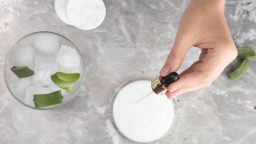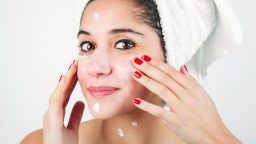The beauty industry has long been known for its heavy use of plastic packaging, chemicals, and wasteful practices. But as environmental awareness grows, many beauty enthusiasts are looking for ways to reduce their impact on the planet while still maintaining their beauty routines. Fortunately, there are plenty of eco-friendly beauty swaps you can make right now to help you achieve a more sustainable and ethical approach to your self-care. Here’s a guide to easy, effective, and eco-conscious beauty swaps to help you make a positive difference.
- Switch to Reusable Makeup Remover Pads
Traditional cotton pads, used to remove makeup or apply toners, are often single-use and contribute to unnecessary waste. A simple swap to reusable makeup remover pads can drastically reduce your beauty waste.
- Why Reusable Pads?: Reusable pads are made from sustainable materials like bamboo, cotton, or microfiber. They can be washed and reused multiple times, cutting down on the need for single-use pads.
- How to Use Them: Just dampen the pad with water or your preferred cleanser, and gently remove your makeup. After use, wash them and hang them to dry for your next use.
By making this swap, you reduce your contribution to landfill waste while keeping your skin clean and fresh.
- Opt for Bar Soap Instead of Liquid Body Wash
Liquid body washes often come in plastic bottles, which contribute significantly to plastic waste. Swapping to bar soap is a simple and effective way to reduce packaging waste in your bathroom.
- Why Bar Soap?: Bar soaps are usually wrapped in paper or cardboard, both of which are more easily recyclable or biodegradable. Many bar soaps are also free from synthetic chemicals, parabens, and preservatives, making them a cleaner option for your skin.
- What to Look For: Choose bar soaps made from natural ingredients like shea butter, coconut oil, or olive oil. Look for cruelty-free, vegan, and sustainably sourced options for an added ethical benefit.
Bar soap is not only eco-friendly, but it’s also often more affordable than liquid body wash in the long run.
- Ditch Single-Use Plastic Bottles for Shampoo and Conditioner
Plastic shampoo and conditioner bottles are one of the biggest contributors to waste in the beauty industry. Instead, consider switching to more sustainable alternatives like solid shampoo bars or refillable products.
- Shampoo Bars: These solid bars clean your hair just as well as liquid shampoo, and they last much longer, saving you money and reducing waste. They often come in minimal, recyclable packaging.
- Refillable Bottles: Many brands now offer refillable shampoo and conditioner options, where you can refill your bottles at home with larger, eco-friendly packaging. This helps to eliminate the need for single-use plastic bottles.
By making this swap, you reduce plastic waste while still getting your hair care needs met.
- Choose Sustainable Beauty Tools
Beauty tools like brushes, combs, and sponges are often made from synthetic materials, which aren’t biodegradable. Swapping to tools made from natural, renewable materials can significantly reduce your beauty routine’s environmental footprint.
- Eco-Friendly Brushes: Look for brushes made from sustainable materials like bamboo, wood, or recycled plastic. Natural bristles (such as vegan-friendly synthetic fibres) are also a great option.
- Biodegradable Sponges: Choose sponges made from natural materials like konjac or cellulose, which are biodegradable and compostable.
Investing in high-quality, eco-friendly beauty tools not only supports sustainability but also ensures long-lasting, durable products.
- Switch to Eco-Friendly Makeup Packaging
Makeup packaging is notorious for its use of plastic and non-recyclable materials. Many beauty brands are now focusing on reducing packaging waste and offering more sustainable options.
- Refillable Makeup Containers: Some makeup brands now offer refillable compacts for foundation, blush, or eyeshadow. Instead of buying new products in disposable packaging, you can simply refill your compact and use it again.
- Brands with Sustainable Packaging: Look for makeup brands that use recyclable, compostable, or biodegradable packaging. Some brands even offer packaging made from ocean plastics or recycled materials, contributing to environmental conservation.
Making the switch to more sustainable makeup packaging is a small yet effective way to reduce waste while still enjoying your beauty products.
- Switch to Natural, Eco-Friendly Skincare Products
Many conventional skincare products contain harmful chemicals and come in plastic packaging. By switching to natural, eco-friendly skincare products, you can reduce your exposure to toxins while also benefiting the planet.
- Eco-Friendly Ingredients: Look for products that are made with organic, sustainably sourced ingredients. These products often have minimal environmental impact and are free from harmful chemicals, such as parabens, sulfates, and phthalates.
- Glass and Aluminum Packaging: Many skincare brands now use glass or aluminum packaging, which is recyclable and more sustainable than plastic. Opt for products with these types of packaging when possible.
Natural skincare is not only better for the environment but also for your skin’s overall health.
- Use Cloth Towels Instead of Paper Towels
While paper towels are often used to dry your face or clean up makeup spills, they are single-use and wasteful. A simple swap to reusable cloth towels can reduce your paper consumption significantly.
- Why Cloth Towels?: Cloth towels can be used multiple times and washed, reducing waste. You can use them to gently pat dry your face after cleansing or as an alternative to paper towels when cleaning your beauty tools.
- What to Look For: Choose towels made from natural fabrics like cotton or bamboo for a more sustainable option. Microfiber towels are also great for absorbing moisture without needing a lot of product.
Using reusable towels instead of paper towels is a quick and easy way to be more eco-conscious in your beauty routine.
- Switch to Natural Deodorant
Conventional deodorants often come in plastic packaging and contain chemicals like aluminium, which can be harmful to the body and the environment. By switching to a natural deodorant, you not only reduce plastic waste but also avoid exposing your skin to potentially harmful ingredients.
- Natural Ingredients: Look for deodorants made from natural ingredients like baking soda, coconut oil, and shea butter. These ingredients are gentle on the skin and are often free from synthetic fragrances or preservatives.
- Plastic-Free Packaging: Many eco-friendly deodorant brands now offer deodorants in paper or metal packaging, which are fully recyclable or biodegradable.
Making the switch to natural deodorant is a simple yet impactful way to reduce waste and support your skin’s health.
- Make Your Own DIY Beauty Products
If you want to go one step further in your eco-friendly beauty journey, consider making your own beauty products at home. Many natural ingredients like honey, coconut oil, avocado, and oats can be used to create nourishing face masks, scrubs, and moisturisers.
- Why DIY Beauty?: Making your own beauty products allows you to control the ingredients and packaging, ensuring everything is natural and eco-friendly. You can reuse jars or containers that you already have at home, cutting down on waste.
- Simple Recipes: Look up simple DIY beauty recipes that require minimal ingredients, such as a honey and sugar scrub, or an avocado and olive oil hair mask.
DIY beauty is a fun, creative way to cut down on waste and enjoy products tailored to your specific needs.
- Opt for Eco-Friendly Hair Care Products
Hair care products, like shampoo and conditioner, are often housed in plastic bottles that end up in landfills. Switching to eco-friendly hair care can reduce both plastic waste and harmful chemicals in your products.
- Refillable Shampoo and Conditioner: Choose brands that offer refillable options, allowing you to purchase larger bottles that can be reused or refilled at a local store.
- Solid Hair Care: Shampoo bars and solid conditioners are excellent alternatives to traditional liquid formulas. These products usually come in minimal or plastic-free packaging, reducing environmental impact.
- Natural Ingredients: Look for shampoos and conditioners made with natural, organic ingredients like aloe vera, coconut oil, and argan oil. These ingredients are not only good for your hair but are also biodegradable and safe for the environment.
Eco-friendly hair care options help you look after both your hair and the planet.
Conclusion
Switching to eco-friendly beauty products doesn’t have to be overwhelming or expensive. By making small, thoughtful changes to your routine—like swapping plastic packaging for refillable options, choosing natural ingredients, and reducing single-use items—you can make a significant positive impact on the environment. Start with one or two swaps, and over time, build a more sustainable beauty routine that aligns with both your values and your skin’s needs. Every eco-friendly choice counts!





